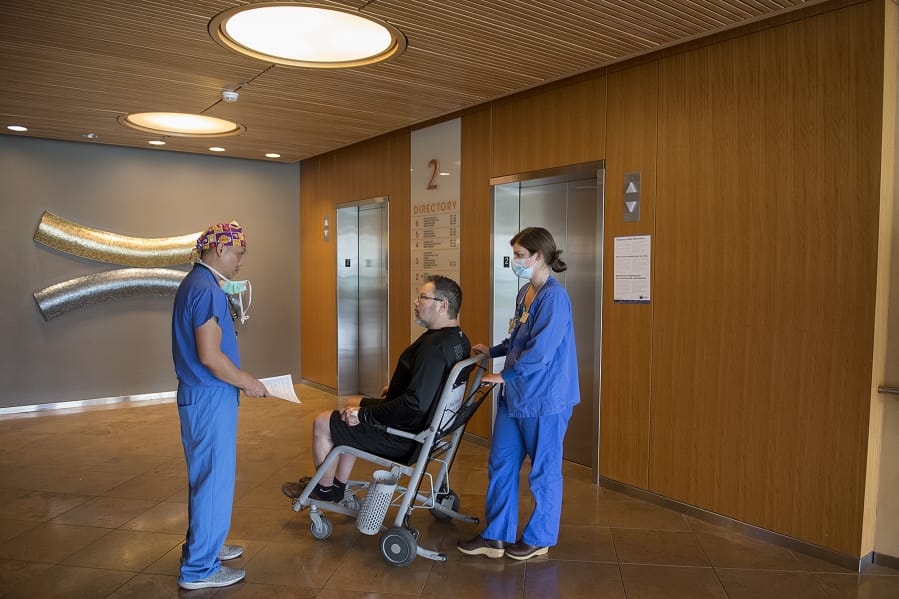For surgeon Dr. Nelson Saldua, sitting on the sidelines was a difficult professional sacrifice he experienced during the pandemic.
Because of restrictions on nonurgent medical procedures, Saldua saw his spine surgery practice dry up for about two months.
“We knew they were in pain, and to be unable to take care of those patients was difficult,” said Saldua, an orthopedic spine surgeon with Vancouver Clinic who operates out of Legacy Salmon Creek Medical Center.
In mid-March, Gov. Jay Inslee ordered a halt to all elective surgeries and dental procedures to help preserve personal protective equipment. His order expired in mid-May, and hospitals and clinics have been coming back online ever since.
Leadership at Legacy and PeaceHealth Southwest Medical Center say they are confident about the financial present and future of their hospitals, but they’re concerned about patients seeking timely treatment.
In April, Clark County hospitals and clinics saw drops for in-person visits to the emergency department. Patients were concerned about the safety of medical facilities and also wanted to be mindful of not overburdening the health care system.
In April, PeaceHealth saw a nearly 50 percent drop in its daily average of emergency department visits, and problems began to emerge when patients delayed necessary care because of fears around visiting a hospital.
“We have had several cases of patients coming in for serious, emergent health issues, including heart attacks and strokes, that have delayed care to the point it has impacted their outcome,” Dr. Jason Hanley, PeaceHealth Southwest Medical Center Emergency Medicine director, said in a news release.
PeaceHealth and Legacy have started to see promising data more recently around patients returning for care.
Legacy Salmon Creek President Jon Hersen said the hospital’s emergency department volumes have returned to 80 to 90 percent of usual, but hospital officials are still worried about patients visiting the hospital later than they should.
“The people we are seeing are much sicker and higher acuity than they have been previously,” Hersen said. “It’s really important for people to seek care.”
Dr. Lawrence Neville, the chief medical officer at PeaceHealth Southwest, said the hospital conducted about 50 percent of its scheduled surgeries during the restrictions on nonurgent procedures. The hospital is working through a backlog of surgeries now to catch up on postponed procedures.
PeaceHealth is also seeing patients delaying care, similar to Legacy. Neville mentioned some patients have had heart attacks at home, and waited days to get care. One person waited days to get care for a burst appendix.
“It’s really heartrending to hear,” Neville said. “It’s imperative to seek health care like you did before COVID. The hospitals are incredibly safe places to get it done.”
Neville and Hersen agreed that more virtual care options should increase access to health care, which is ultimately a good thing. But in-person visits can still be necessary.
Hospitals are following sanitary guidelines from the state, restricting visitors and testing patients for COVID-19. Hospitals also need adequate personal protective equipment and surge capacity to operate right now. As Saldua mentioned, medical facilities are probably some of the safest places to be right now because of the guidelines in place.
“I don’t think anything is 100 percent safe,” Saldua said, “but we are making it as safe as possible.”




